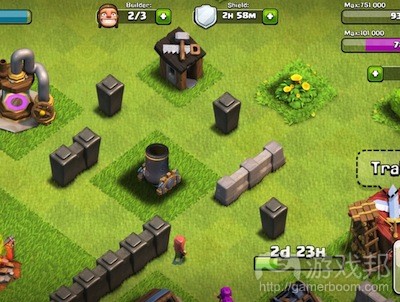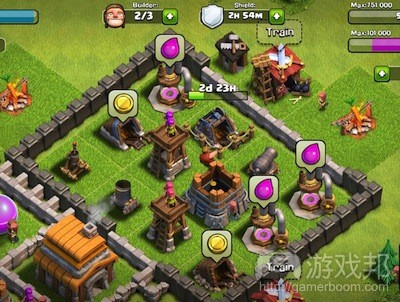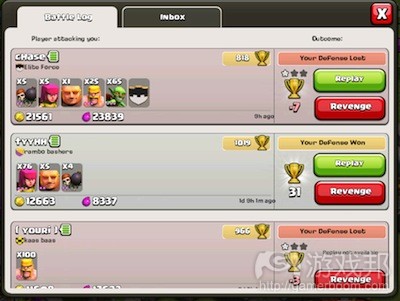分析《Clash of Clans》游戏设计的粘性
作者:Kevin Oke
到现在为止,Supercell的《Clash of Clans》(以下简称COC)已经称霸iOS应用商店总收益排行榜好几个月了。在玩这款游戏的过程中(渐渐上瘾),我终于知道这款游戏为什么能够套牢玩家了。
有意义的休战期机制
将对战作为强制循环的一部分的游戏往往不能处理好玩家的休战期。准确地说,让玩家在休战期内保持沉浸感是非常重要的,因为大多数吸引人的玩法和核心机制都与产生休战期的对战机制紧密相关。在城市经营类游戏中,玩家在休战期通常只能重新组织他们的城市——总地来说,这是肤浅的玩法。
本质上,COC是不同的。玩家部落的组织不仅关乎成败,而且在搬金币和大炮的休战期也可能产生直接的微交易。
给那些没玩过COC的人科普一下:你的建筑、城墙、陷阱和武器的布局是关键,因为你必须防御其他玩家的进攻。快速做好防御工事成为COC玩家的主要工作,因为要保护金库和能量库。玩家可以使用游戏的回放功能(之后再说)查看自己在游戏过程中的得失,以便下次调整布局、补缺补漏。
总之,这是一个很棒的休战期机制。为什么?
1、有实用价值
2、延长玩家的游戏时间(20级的玩家很可能要花半小时休整全部防御工事)
3、刺激消费——“如果升级大炮,只要两个就可以守住部落的南面了。但我没有那么多金币……但如果我不升级,我就太弱了。”玩家就是怀着这样纠结的心理开始消费的。
4、玩家的要塞布局具有个人风格。这更能吸引玩家长期游戏。
如你所见,这不仅是一段良好的休战期,而且是一种出色的玩法机制。
循环优化
循环优化使玩家能够在游戏过程中不断发现和开发技巧。在社交游戏中,比如《Farmville》,要求玩家在最佳金币/经验消耗率下种植种子;在竞技游戏中,为了延长玩家在游戏中的沉浸感,往往使玩家很难彻底掌握游戏,从而刺激玩家挑战极限;社交游戏则鼓励玩家每天多上线。
COC中的循环优化主要靠资源收集和进攻。玩家为了最高效地得到金币和能量,必须在建筑的资源生产能力达到最大时返回游戏收集。时间是关键,这就好比打开水龙头,让水桶接水自己走人,回来后发现水都溢出来了——资源浪费了。虽然这不是COC的独有的特点,但对玩家来说,每天尽可能多次上线仍然是很重要的。
更加有趣的循环优化在于PVP和进攻的威胁。囤积了大量金币和能量的玩家最容易成为别人的进攻目标。这就刺激了玩家经常上线,并做以下两件事:
1、从资源生产器中收集新产生的资源,然后存进仓库;如果玩家够聪明的话,仓库应该建在防御工事后面。
2、立即收集和使用资源。
因为在给定的时间内(根据城镇中心的等级),玩家只能建造一定数量的防制工事,但总是不够保护所有建筑。
因此,玩家不得不经常上线,消费或将金币和能量转移到比较安全的仓库中——把仓库建在城墙后面、靠近防御塔和大炮的地方,这是常见策略;可以把金矿和农民留在外面,因为他们身上能放的东西很少,就算被打劫了损失也不大。
这意味着为了升级而囤积资源其实是一件很冒险的事。囤积使用的时间越多,如果玩家被攻击,资源损失就越大、浪费的时间就越多。玩家意识到这种风险后,花钱的可能性就更大了。Supercell设计了一种保护功能,在玩家囤积资源时可以保护玩家不被攻击。或者,玩家也可以用真钱购买解决相应问题的道具。
回放功能
更新后的COC添加了回放功能。这个功能很不错,一旦玩家找到防御工事的薄弱点,也就知道自己为什么会失守了,进而花更多时间和钱来完善防御工事。一定程度上,回放功能发挥了指导作用。
消息提示策略
COC的消息提示非常实用,一方面能吸引玩家返回游戏,另一方面它本身并不无聊。当消息提示告诉玩家他们的部落被进攻了,玩家自然会上线游戏并花钱调整防御工事。当消息提示告诉玩家资源被偷时,心急的玩家不得不花钱赶上别人的进度。
消息提示在实用和简约上达到平衡,甚至让玩家不忍心关掉它。我认为开发者采用这种克制的方法是因为PVP进攻发生时,消息提示的信息是很实在的,如果显示太多东西,反而会招人厌烦。
结论
COC除了让Supercell大赚一笔(游戏邦注:据报道,该公司仅靠两款iOS游戏,日收益就接近100万美元),确实是一款很吸引人的游戏,因为它具有相当严密的游戏循环和经济系统,值得所有设计师学习。尽管它仍然缺少具有凝聚力的社交体验,但即便是免费游戏的最激进反对者也能看到开发者制作这款游戏的用心与诚意。(本文为游戏邦/gamerboom.com编译,拒绝任何不保留版权的转载,如需转载请联系:游戏邦)
Guest Post: Clash of Clans engagement analysis
by Kevin Oke
Supercell’s Clash of Clans (CoC) has been a top grossing title on the iOS app store for months now, and in the course of playing (and becoming addicted to) the game, I began to unravel just how it manages to engage and retain players so well.
Meaningful Downtime Mechanics
Games relying on appointment mechanics as part of their compulsion loop typically have trouble addressing the downtime that arises in between these appointments. Specifically, how to engage players during this time, as generally the most engaging gameplay and core mechanics are intertwined with these downtime-creating appointment mechanics. In city builder games, usually the only thing available to the player during downtime is re-organizing their cities — shallow gameplay, generally speaking.
In this sense, CoC is no different. However the composition of the player’s village is not only vital to success, but a downtime session of moving gold mines and cannons around can directly lead to a micro-transaction.
A quick explanation for those that have not played CoC: The layout of your buildings, walls, traps, and weaponry are key, as you need to defend against raids from other players. An airtight defense quickly becomes the obsession of CoC players as they try to protect their stores of gold and elixir. Using the Replay feature (more on this later), they watch and learn from their defeats, tweaking their layout to patch holes in their defense.
In short, this is a fantastic downtime mechanic. Why?
It’s meaningful.
It creates additional, long play sessions (a level 20 player could easily spend half an hour doing a total revamp of their defenses).
Spurs on purchases — “I could defend the south side of the village with just these two cannons if they were upgraded. But I don’t have enough gold … But if I don’t upgrade, I’m too vulnerable.” A perfect example of this mechanic leading to a micro-transaction.
The player’s fortress layout is personal and unique. This attachment is great for engagement long-term.
As you can see, this isn’t just a fantastic downtime mechanic, but a fantastic gameplay mechanic period.
Loop Optimization
Loop optimization provides the player with tricks to discover and exploit over the course of their lifetime within the game. A prime example in social games is Farmville players finding and planting the seeds with the best coin/XP cost ratio. Instances of loop optimization help with long-term engagement by making a game more difficult to grok, and in competitive games, providing an edge to players with the will to unearth them. In social games with appointment mechanics, they also create more sessions per day.
Loop optimization in CoC is centered on resource collecting and raids. In classic appointment mechanic fashion, for the player to most efficiently harvest gold and elixir they need to return to the game and harvest right when the resource generating structures are at max capacity. Harvest any time past that point, and it’s the equivalent of turning on a tap to fill a bucket and leaving, coming back, and seeing the bucket overflowing — wasted resources. This is not unique to CoC in any way, but it’s still important in maximizing the number of daily sessions per player.
The more interesting loop optimization comes from player vs. player (PvP) and the threat of raids. Leaving hoards of gold and elixir sitting around makes the player a very appealing target for raids. Thus they are encouraged to check in often and do one of two things:
Collect their resources from the buildings that generate them, moving them into their storage units, which if the player is smart, are behind fortifications.
Collect and spend their resources immediately.
As the player can only build a certain number of defenses at any given time (based on the level of their town hall), they can never provide adequate protection for all of their structures.
Thus the need to check in often and spend, or move the gold and elixir to storage units that are better protected — it’s a common strategy to keep storage units behind walls and near archery towers and cannons, and leave gold mines and elixir collectors out in the open, as they store much less and therefore are less of a loss if pillaged.
This all means that saving up for big-ticket upgrades and buildings is risky. The more time spent saving up, the bigger the loss and time wasted if the player is raided. Recognizing that a moment of tension and risk is a great time to conduct a micro-transaction, Supercell offers a shield that will protect the player from raids while they are saving up. Or the player can just buy the item in question immediately with hard currency.
Replay Feature
The replay feature was added to CoC in an update, and in short, it’s brilliant. Allowing the player to see first-hand how they got raided by pointing out the weak points in their fortifications makes them spend more time and money in-game adjusting their defenses. It functions as a useful tutorial, of sorts.
Push Notification Strategy
CoC’s push notifications are useful, draw the player back into the game for another session and aren’t spammy. Push notifications telling the player that their village has been raided are particularly effective at creating both new sessions and monetization. Stolen resources set the player back in the “harvesting” portion of the game loop, which can lead to micro-transactions by impatient players wanting to catch up.
You would be hard pressed to ever want to turn off the game’s push notifications because of this balance of utility and unobtrusiveness. I believe this restrained approach has been taken because the threat of PvP raids creates an organic source of notifications that, if combined with too many “hard coded” ones, could have become annoying.
Conclusion
Behind the gaudy revenue that it brings in (Supercell reportedly makes approximately $1 million a day between its two iOS titles), Clash of Clans is a highly engaging game with an especially tight game loop and economy that deserves every designer’s attention. Although it is still lacking a cohesive social experience, even the most cynical opponents of free-to-play games can see the care and attention that has gone into creating it.(source:insidemobileapps)
下一篇:探讨游戏艺术和游戏设计的美学意境












































